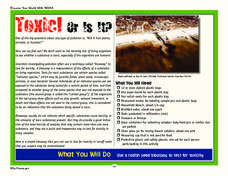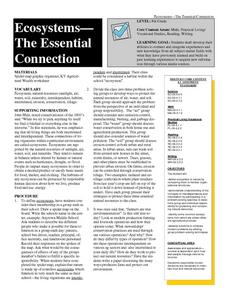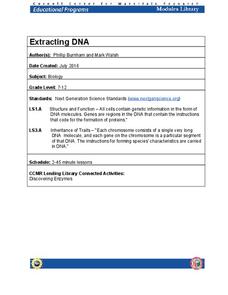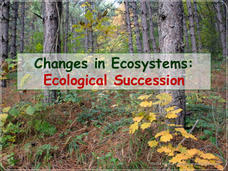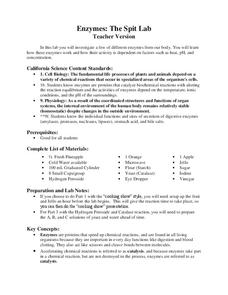Curated OER
Water Topics
In this science learning exercise, students focus on the role of water in the environment and its many uses. They answer questions in the multiple choice and short answer form.
Curated OER
2nd Grade - Act. 25: Creature Creation
Create a creature using some of the characteristics of a real animal. Second graders will read a book from the "Froggy," series by Johnathan London to learn about the characteristics of frogs. After discussing and recording various...
Curated OER
Appearances Are Deceiving
Young scientists study creeks around their area to see how clean the water really is. One way to tell is by the invertebrate populations that are present. This lesson introduces a game which learners simulate a variety of species found...
Curated OER
The Water We Drink
Third graders relate that the quality of their drinking water is subject to the condition of the environment and water found in streams and creeks in their community. They track the travel of a wad of paper from a student's desk to a...
Early Childhood Learning and Knowlege Center
My Body My Senses
In a comprehensive unit of activities, learners explore the five senses. Youngsters discover the many different body parts and their functions that allow humans to have sense of sight, touch, smell, taste, and hearing. The best way to...
Curated OER
Recyclers to the Rescue
Producers, consumers, food chains, and plants are the stars of this science lesson. Learners take part in an inquiry which helps them to discover the most effective and efficient way to grow a producer. They have a variety of containers...
NOAA
Toxic! Or Is It?
Super scientists tests the toxicity of water using radish seed bioassays. Over the course of five days, scholars observe the germination process of several radish seeds, looking closely at their roots to determine the level of toxins...
Channel Islands Film
Restoration Channel Islands Debate
Introduce learners to the debate format with an activity that uses the National Park Service's controversial Channel Islands restoration program as a topic. Class members learn how to generate provocative debate questions, how to prepare...
WolfQuest
The Return of Gray Wolves to Yellowstone National Park: Right or Wrong?
Should gray wolves be removed from Yellowstone National Park? After researching the complex relationships between the various habitats and species at Yellowstone National Park, including humans, class members take a position on the...
Curated OER
Pond Ecology
A lab activity is a great way to incite thoughtful questioning and scientific processes. Pupils will collect organisms with a Petri dish, make observations, sketch the organism, ask questions, then attempt to identify the specimen...
NOAA
Endangered Species Origami
Make sea turtle or whale origami in a hands-on activity that provides instructions for folding and facts for learning about each.
American Museum of Natural History
Journey to the Bottom of the Sea
Properties of water make it essential for the life of marine species. Learners complete an online game to answer questions about the role water fulfills for organisms in ocean habitats. The game emphasizes the properties of water and how...
K12 Reader
Adapting to Survive
Life science and language arts come together in a passage about animal adaptation. After kids learn about how organisms adapt to conditions in their environments, they complete five reading comprehension questions based on context clues...
K12 Reader
Active and Passive Transport
Active and passive systems used to transport materials to and from cells are the subject of a comprehension worksheet that asks readers to use information from the article to answer a series of questions based on the text.
Alabama Learning Exchange
Good Litter, Bad Litter
Which ones can be thrown on the ground? Discover the difference between natural litter and unhealthy trash, helping scholars by using several examples. Use the information here to give them a basic background, but also encourage prior...
Curated OER
Ecosystems-The Essential Connection
Students develop their abilities to solve problems both in school and in a variety of situations similar to that they have encountered in life. They define the term ecosystem in nature by comparing them to familiar organizational...
ARKive
Temperate Rainforest in the Pacific Northwest
Explore the amazing temperate rainforest of the Pacific Northwest. Your class starts by investigating the animals and plants of the Northwest, specifically Washington, and then research an animal population common to the area. In small...
Cornell University
Extracting DNA
Uncover the basics of DNA structure through exploration activities. Collaborative groups build DNA models and recreate the process of replication. Then, using plant cells such as peas or strawberries, they extract a DNA sample.
Curated OER
Marine Sanctuaries
Students delve into diverse marine ecosystems and the problems they face. They discover students the national marine sanctuaries found in the Pacific and Atlantic oceans and off the coast of American Samoa.
NASA
Geographical Influences
"If global warming is real, why is it so cold?" Distinguishing the difference between weather and climate is important when it comes to understanding our planet. In these activities, young scientists look at the climate patterns in a...
Chicago Botanic Garden
Food for Thought: Climate Change and Trophic Cascades
Learners examines the arctic food web with a short video about polar bears and an article about bears and warming temperatures. They design an arctic food web and discuss the trophic cascade that could come from climate change.
Biology Junction
Changes in Ecosystems: Ecological Succession
Can an area with no soil turn into a forest? Scholars learn about the process of ecological succession using an interesting presentation. It covers both primary and secondary succession in the building of new ecosystems.
Curated OER
Life Cycle of Trees
Turn your students into young tree-tectives with this fun science investigation into the life of trees. To begin, a class volunteer gets dressed up in a tree costume as the different parts of trees are introduced. Then, the class learns...
LABScI
Enzymes: The Spit Lab
Enzymes in our bodies each have a job to do. Learn the factors that affect the activity of some enzymes using the third activity of an informative 12-part biology series. A three-part laboratory activity asks teams to investigate how...








